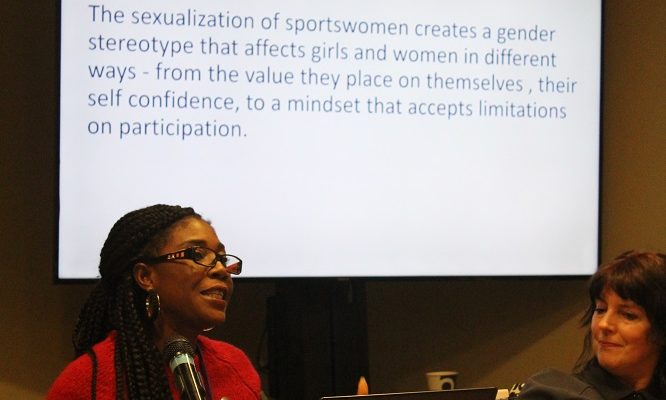A blog by Margaret Clark, SIGBI Assistant Programme Director, Advocacy
“The UK Mission and Civil Society held their first joint event at CSW62 – A flagship occasion organised by the UK Gender Equality Office and UK CSW Alliance. This was the fruition of months of working in partnership, and together they agreed to organise a presentation on the CSW62 Review Theme: ‘Participation in and access of women to the media, and information and communications’. Presenters were sought from around the globe to share information on the following topic:
Sexualisation of the Media, Moderated by Elysia McCaffrey UK Government Equalities Office

Speaker – India
Ruchira Gupta Founder Presenter of Apne Aap and NYU Professor spoke on her work in India. Ruchira left journalism after working on stories of a missing girl, trafficking and brothels in Mumbai, Delhi and Calcutta, and now gives her strengths to addressing violence against women and girls.
India is the third largest user of pornography in the world and as a result of violent porn, there has been a rise in a violent rape culture in India. Often in porn women are seen saying “no” when they are actually consenting to sex. Therefore men think that when having sex with a women and she says “no” this can mean “yes”. There have been several cases where, when caught after rape, men have confessed they had watched porn first. Twenty years on it has been recognised by some producers that, porn is rape with the camera turned on. Some producers are now realising that historically they have been guilty of violence against women say, “sadly they can’t turn the clock back”
The beauty industry is subjugating with a rising industry in Delhi and Calcutta regarding the reconstruction of women’s vaginas, and this can be seen to be a fast growing prestigious area of business… Why? “Men getting a bigger kick”. Status.
The old narritive persists – thin girls are seen to be more attractive, causing girls to struggle with their bodies, making them more vulnerable to suffering from eating disorders; Girls aged as young as 9 and 10 years old, compete in talent and reality shows which extremely sexualise children – cute in a sexy way – and sadly this is becoming normalised. In 2016 child labour was legalised for entertainment. Fashion and the sex industry work together – a big market where profit is OK, but the result is loosing control of sexuality.
Speaker – Bulgaria
Ms Genoveva Tisheva, Managing Director of the Bulgarian Gender Research talked of the issues of young people in Bulgaria – advocating for the inclusion of parents in raising awareness of the dangers of abusive media entertainment. Child Protection and other agencies are not enough. Awareness with parents is essential with the age of the young suffering abuse through social media lowering from the age 17 years to 14 years and below.
Revenge porn is on the rise – ruining lives with some never recovering. With the constant use of harassment through social media, young people are not in possession of their lives anymore. This can result in suicide. Essential needs include, more stringent legislation, more documentaries to educate people from institutions, and more parental support. Many suffer from shame as a result of porn and support services are essential.

Speaker – Nigeria
Sexualisation of sports women in Nigeria was highlighted by Oge Pepsie Adiukwu, CEO Peps-Pean Productions Director OGE WYCYEI. She is also a member of a Soroptimist Club about to be Chartered in Abuja, Nigeria.
Sexualisation undermines the legitimacy of women’s sport. The talents and skills women have to offer are undermined. Men are portrayed as strength, and women as style, but women attack the game as men. Unfairness is highlighted with the lack of parity in competitions placing sexuality over athleticism. The women Bobsleigh team made history the first ever to go to the Olympics. They raised funds to compete. One of the examples of the unfairness of gender equality was when the Falcons won the African Women’s Championship eight times and the men won three times but the men’s success had more media coverage.
Women in sport can suffer from sexual harassment, as well as mental health, body image and self confidence issues. Pepsi says:”Sexualisation is not bad, sexual harassment is”.
Speaker – UK
Rosalind Gill, Professor of Social and Cultural Analysis at City University, London UK, is an academic who has worked on gender, sexuality and media for 20 years and feels that less time should be concentrated on sexual identity, and more on what people want.
There is a need for sexual education and sexual advice in the media. Out of fifty books read on sexual advice and the media, only two mentioned consent. The importance of diversity is not just one thing, bodies are differently marked and sexualised. When men’s bodies are sexualised they are loaded with power. Rape is a crime of power rather than desire overturned.
On a social media dating site vicious forms of misogyny were found. A survey taken with school children aged 14-16 years found high mobile phone users and photo culture, with mental health issues, suicides, with revenge porn a huge issue. One student bragged of having 32 pictures.
We are all living in a photo era with possession of pictures giving power.
A successful event thanks to a collaborative team. Here’s to the next one”.
The event was filmed by UN and also by a male champion journalist of gender equality from Ghana who was keen to transfer knowledge in his own country and beyond.

